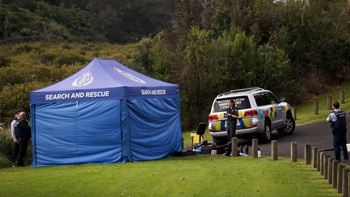Natural disasters and the intentional spread of harmful information are seen as the highest risks to New Zealand’s national security, according to a landmark briefing.
It warns the country’s increasingly divided and ageing population could become further vulnerable to extremist ideologies, online attacks from malicious overseas actors and the negative impacts of war and climate change - if efforts to educate Kiwis and shore up New Zealand’s defences are not furthered.
It also includes what’s considered a surprising finding that New Zealanders feel particularly at risk of a cyber-attack - something the briefing acknowledges the Government can’t adequately protect its citizens from.
The document, titled the National Security Long-term Insights Briefing, will be discussed at a Countering Terrorism and Violent Extremism hui in Auckland this week.
The briefing, the first of its kind, was produced by nine Government agencies and surveyed 1000 people to test the mood of the nation concerning the perceived risk of various threats to national security.
“The release of this briefing is an opportunity to talk openly about the most significant threats New Zealanders are concerned about for the next decade as well as the work we are doing to combat or prepare for those risks,” Prime Minister Jacinda Ardern said yesterday.
Respondents were asked how real they felt the threat was of 16 different incident-types occurring in New Zealand in the 12 months, or the next 10 years.
Predictably, respondents considered the risk of a natural disaster was highest - 87 per cent believed a natural disaster would hit New Zealand in the next 12 months, and 91 per cent believed it would happen in the next 10 years.
It was significantly higher than the level of concern felt in other countries, 69 per cent on average.
“It is not surprising that New Zealanders feel concerned about natural disasters occurring, given our vulnerability to events like earthquakes, floods, droughts and volcanic activity,” the briefing said.
/cloudfront-ap-southeast-2.images.arcpublishing.com/nzme/UEXTPQ6MESEPN4WZ2EAVLZCBFE.jpg)
The earthquakes that hit Christchurch more than 10 years ago reminded Kiwis how vulnerable New Zealand is to a natural disaster. Photo / Mark Mitchell
It did acknowledge the surprise at the level of threat New Zealanders felt the hacking of information systems presented, registering as third-highest behind misinformation (including disinformation).
“What is particularly interesting in the context of this briefing is the level of concern about threats caused by people or countries wishing to do us harm (often referred to as “malicious actors”), such as hacking (attacks by cyber criminals and country-backed malicious actors who steal, expose, alter, disable or destroy information through unauthorised access to computer systems), or organised crime (illegal activity across national borders).’
Eighty-one per cent of respondents felt the risk was high in the coming 12 months, 77 per cent in the next 10 years - compared to 75 per cent in other countries.
Looking to the next 10-15 years, the authors identified four global trends that would influence the most significant risks to national security:
- Increasing competition between countries and the “continued deterioration” of the rules-based international order
- Technological change
- Climate change
- The ongoing effects of Covid-19 and future pandemics.
/cloudfront-ap-southeast-2.images.arcpublishing.com/nzme/5IB3IVC764X42O7UF42P6YQMCY.jpg)
The ongoing impact of Covid-19 and the threat of future pandemics were prominent in the briefing. Photo / Supplied
Considering those trends, the briefing noted how New Zealand’s population in 15 years’ time would be older, more diverse and more urban, meaning a rethink of how security threats were addressed was required.
“We believe we need to respond to this development by changing the way we engage with New Zealanders to encourage more inclusive and representative participation.”
The briefing contained three hypothetical outcomes that predicted how risks posed to national security could evolve.
Under a scenario dubbed “continued decline”, authors described an increasing chance of war as the “rise of nationalism pervades the international landscape” and competition for resources increased the chance of direct conflict.
“A deteriorating global order means transnational organised crime thrives, including online, and some states are more brazen in their willingness to interfere and disrupt our way of life – including through cyber-attacks and espionage,” it said.
The authors highlighted New Zealand’s older population would be more vulnerable to extremism and false information.
“There is little shared public understanding of the challenges we face in New Zealand, and in the context of an ageing population, cycles of inequality and automation in the workforce, some will be particularly susceptible to extremist ideologies spread online and shaped by mis[information] and disinformation.”
Under “dramatic decline”, the authors posed a scenario where conflict in Europe continued, particularly in Ukraine, as other countries joined the war with an “ever-present threat” that nuclear weapons could be used.
The scenario also included Indo-Pacific conflict, citing tensions between China and Taiwan, and accelerating climate events which led to countries directly competing for resources while in New Zealand, threats to national security increased.
“A lack of resourcing, information sharing and the spread of sophisticated technology-enabled mis[information] and disinformation makes it difficult for people to tell fiction from fact.
“New Zealand is more polarised than ever, trust in the institutions of state is diminished, threatening the foundations of our liberal democracy.”
Researchers did include a third “optimistic and improving” option, in which countries had a “strong impetus” to meet global challenges on climate change and national security threats.
“Greater transparency, open and accessible information-sharing, engagement and partnership between government and the public increases trust, confidence, and social licence to respond to national security challenges.”
Researchers profiled six individual national security risks facing New Zealand:
- Disinformation
- Hacking and cyber-attacks
- Transnational organised crime
- Foreign interference and espionage
- Terrorism and violent extremism
- Pacific resilience challenges
Of particular concern was disinformation, the false or modified information knowingly and deliberately shared to cause harm, leading to “radicalisation and violence” in some cases.
The briefing highlighted the elevated risk posed by disinformation and how it could take the form of well-resourced, sophisticated campaigns to push “false or deceptive information”.
/cloudfront-ap-southeast-2.images.arcpublishing.com/nzme/D3YUKWGYCQOP574ZMSCSFOZZLY.jpg)
A series of deepfake videos, where actor Miles Fisher posed as Tom Cruise, were posted online last year. Photo / TikTok
A recent New Zealand example was cited - after December last year, Microsoft reported Kiwis were subjected to a spike in exposure to Russian disinformation, much of which related to Covid-19.
“This spike preceded an increase in protests against Covid-19 measures and other issues in New Zealand.”
An increase in the prevalence and sophistication of disinformation was expected, alongside the potential for countries to purposely encourage division in New Zealand. New technology, like deepfakes, could undermine trust in information.
The briefing called for greater efforts to detect disinformation campaigns and calling out those responsible.
On cyber attacks, the report referenced four high-profile cyber attacks on the New Zealand stock exchange, Reserve Bank of New Zealand, Waikato District Health Board and a $30 million hack on a Christchurch-based cryptocurrency exchange.
Over 2020/2021, New Zealand’s Government Communications Security Bureau recorded 404 attacks against “nationally significant organisations”, an increase of 15 per cent from the previous year. It was estimated GCSB defences against attacks had prevented almost $200m of harm.
The report acknowledged Government did not have “all the tools” to keep New Zealand safe from cyber attacks.
“Businesses and individuals will need to become more security aware and take an active role in their own protection against cyber attacks.”
The adaptation and sophistication of transnational organised crime were also forecasted, deepening groups’ hooks in new Zealand’s disadvantaged communities.
Enabled by evolving technologies, foreign interference was expected to become increasingly difficult to prevent and there would be a greater risk of countries pursuing their objectives secretly.
With 80 per cent of respondents expecting a terrorist attack in the next 10 years, the report said an increasing spread of hate would contribute to more threats of terrorism and increasingly diverse extremist ideologies.
Looking at the next 10-15 years, the report compiled data that indicated Kiwis felt New Zealand’s national security agencies lacked transparency and accessibility, which hindered education concerning threats.
The briefing concluded with a call for information to be more publicly accessible, to strengthen political leadership on national security, to foster international partnerships, to diversify the national security sector, and to boost media coverage on the topic, among others.
Feedback on the briefing could be provided on the Department of the Prime Minister and Cabinet website.
Take your Radio, Podcasts and Music with you









